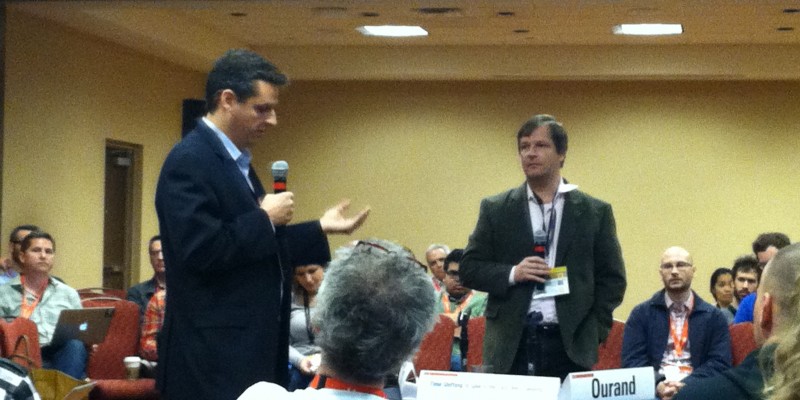You may have heard about a little invention called the DVR. You may also have heard that it makes TV networks and advertisers a tad bit nervous, because fewer and fewer people watch advertisements when they can simply skip through them. Jason Kint isn’t losing any sleep over it. Kint is the General Manager of CBS Interactive’s sports division, and he and his counterparts at sports networks everywhere have every reason to be confident. Sporting events are one of the few types of events on TV that people overwhelmingly still watch live. And on Saturday at SXSW, in a conversation with SportsBusiness Journal’s John Ourand, Kint fielded questions on how CBS and their competitors are all using their extensive online coverage to drive up already robust ratings.
Broadcast sports remains a booming business, with cable providers and sports networks alike reaping the benefits. Ever wonder why your cable bill is so high? Even if you couldn’t care less about sports, you’re paying for the huge fees ESPN charges cable providers to carry their channels. Sports fans are knowledgeable, numerous, and ferociously engaged, and so their eyeballs command a high value.
Of those qualities, it’s perhaps the knowledge that matters the most. Fans of a sport are going to know the outcome of an event almost immediately, whether a given network chooses to broadcast it live or not. NBC faced that conumdrum with its broadcasts of the London Olympics, but discovered something surprising. While NBC did offer live streaming of events during the day and the outcome was known hours before primetime, the TV broadcasts of those same events had enormously high ratings.
Kint describes this as the “water cooler effect.” Online buzz from diehard fans serves to stir up excitement in the more general viewing public. And as for those diehards: “In the world of Facebook and Twitter and social media, the idea of not doing a sporting event live” — online or otherwise — “is just crazy,” Kint said.
Kint relates the story of how he convinced Leslie Moonves and other CBS executives to take their streaming coverage of the March Madness tournament — which had been behind a paywall — to a free, ad-supported model. Ratings for televised March Madness games showed that few people watched the games early in the tournament, but ramped up as the tourney went on. The games became more and more significant, before ratings reached their peak for the championship game.
For the online viewers, Kint crunches the numbers and says, “We found that the inverse was true.” Buzz was building in offices around the country as dedicated fans watched early games played by their favorite teams during the day and ultimately created a more engaged audience for the televised events. The lesson Jason Kint and his bosses took from all this was that, “It’s not gonna cannibalize television.”
“Who here is an out-of-market fan?” Kint asked the audience, referring to those unfortunate expats who no longer live in a place where broadcast games of their favorite teams are available. Nearly everyone in the room raised their hands.
“Who here plays fantasy sports?” Kint asked. Again, nearly all hands in the room went up.
Those are two other big reasons why CBS is producing a robust slate of online content.
“Every game matters,” Kint said, “not just the team you root for. And every minute of every game matters.”


Comments are closed.